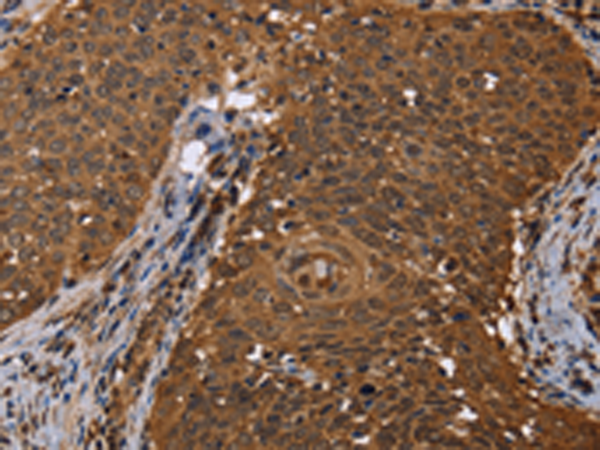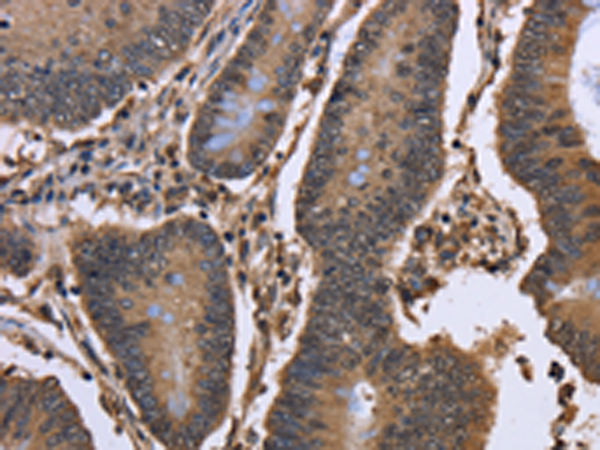


| WB | 咨询技术 | Human,Mouse,Rat |
| IF | 咨询技术 | Human,Mouse,Rat |
| IHC | 1/100-1/300 | Human,Mouse,Rat |
| ICC | 技术咨询 | Human,Mouse,Rat |
| FCM | 咨询技术 | Human,Mouse,Rat |
| Elisa | 1/2000-1/10000 | Human,Mouse,Rat |
| Aliases | SMIF; SMAD4IP1; HSA275986; Nbla00360 |
| WB Predicted band size | 63 kDa |
| Host/Isotype | Rabbit IgG |
| Antibody Type | Primary antibody |
| Storage | Store at 4°C short term. Aliquot and store at -20°C long term. Avoid freeze/thaw cycles. |
| Species Reactivity | Human, Mouse |
| Immunogen | Fusion protein of human DCP1A |
| Formulation | Purified antibody in PBS with 0.05% sodium azide and 50% glycerol. |
+ +
以下是关于DCP1A抗体的3篇参考文献示例(注:内容为模拟,仅供参考):
1. **文献名称**:*DCP1A regulates mRNA decapping and P-body formation*
**作者**:Nishihara T. et al.
**摘要**:研究通过DCP1A抗体验证其在P-body(处理小体)中的定位,揭示DCP1A通过招募脱帽复合体调控mRNA降解,影响细胞应激反应和基因表达调控。
2. **文献名称**:*Interaction between DCP1A and DCP2 in the mRNA decapping complex*
**作者**:Linder B. et al.
**摘要**:利用DCP1A抗体进行免疫共沉淀实验,证明DCP1A与DCP2直接结合,协同调控mRNA脱帽过程,并影响细胞周期进程。
3. **文献名称**:*DCP1A overexpression promotes cancer cell proliferation*
**作者**:Zhang Y. et al.
**摘要**:通过Western blot和免疫组化(使用DCP1A抗体)发现DCP1A在多种癌细胞中高表达,其异常表达可能通过抑制肿瘤抑制因子的mRNA稳定性驱动肿瘤发生。
---
如需真实文献,建议在PubMed或Google Scholar中检索关键词:**DCP1A antibody** + **decapping**/**P-body**/**mRNA degradation**。
DCP1A (Decapping mRNA 1A) is a critical component of the mRNA decapping complex, which regulates gene expression by controlling mRNA turnover. It works alongside DCP2. EDC4. and other proteins to remove the 5' cap of mRNAs, marking them for degradation by exonucleases. This process is essential for post-transcriptional regulation, influencing cellular responses to stress, differentiation, and apoptosis. DCP1A contains conserved WD40 domains that facilitate protein-protein interactions within the decapping complex. Its activity is tightly regulated by phosphorylation and other post-translational modifications, linking it to signaling pathways like mTOR and MAPK.
Antibodies targeting DCP1A are widely used to study mRNA decay mechanisms, protein localization, and interactions in models ranging from yeast to humans. In research, these antibodies enable detection via Western blotting, immunofluorescence, and immunoprecipitation, helping to elucidate DCP1A’s role in cellular homeostasis and disease. Dysregulation of DCP1A has been implicated in cancers, neurological disorders, and viral infections, where aberrant mRNA stability contributes to pathogenesis. For example, reduced DCP1A expression correlates with tumor progression in certain cancers, suggesting its potential as a biomarker or therapeutic target. Commercial DCP1A antibodies are typically validated for specificity across species, aiding cross-disciplinary studies in molecular biology and translational medicine.
×